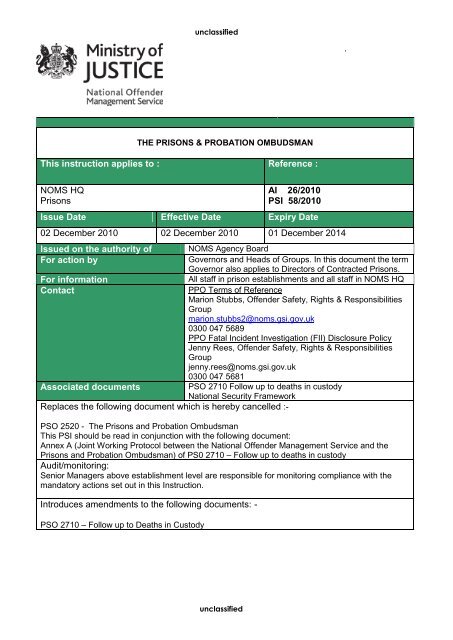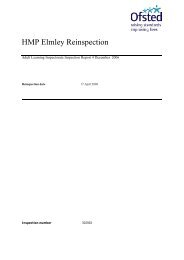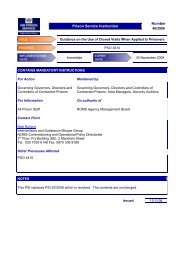PSI 2010-058 - Inside Time
PSI 2010-058 - Inside Time
PSI 2010-058 - Inside Time
- No tags were found...
You also want an ePaper? Increase the reach of your titles
YUMPU automatically turns print PDFs into web optimized ePapers that Google loves.
unclassified.THE PRISONS & PROBATION OMBUDSMANThis instruction applies to : Reference :NOMS HQPrisonsAI 26/<strong>2010</strong><strong>PSI</strong> 58/<strong>2010</strong>Issue Date Effective Date Expiry Date02 December <strong>2010</strong> 02 December <strong>2010</strong> 01 December 2014Issued on the authority of NOMS Agency BoardFor action byGovernors and Heads of Groups. In this document the termGovernor also applies to Directors of Contracted Prisons.For informationAll staff in prison establishments and all staff in NOMS HQContactPPO Terms of ReferenceMarion Stubbs, Offender Safety, Rights & ResponsibilitiesGroupmarion.stubbs2@noms.gsi.gov.uk0300 047 5689PPO Fatal Incident Investigation (FII) Disclosure PolicyJenny Rees, Offender Safety, Rights & ResponsibilitiesGroupjenny.rees@noms.gsi.gov.uk0300 047 5681Associated documentsPSO 2710 Follow up to deaths in custodyNational Security FrameworkReplaces the following document which is hereby cancelled :-PSO 2520 - The Prisons and Probation OmbudsmanThis <strong>PSI</strong> should be read in conjunction with the following document:Annex A (Joint Working Protocol between the National Offender Management Service and thePrisons and Probation Ombudsman) of PS0 2710 – Follow up to deaths in custodyAudit/monitoring:Senior Managers above establishment level are responsible for monitoring compliance with themandatory actions set out in this Instruction.Introduces amendments to the following documents: -PSO 2710 – Follow up to Deaths in Custodyunclassified
unclassified Page 1CONTENTSSection Title Applicable to1 Executive summary All staff2 The Prisons and Probation Ombudsman’s revised Terms All staffof Reference3 Arrangements for informing prisoners about the Prisons All staffand Probation Ombudsman4 Complaints All staff5 Complaints: Investigations and enquiries All staff6 Complaints: Settlement by local resolution All staff7 Deaths in custody investigations All staff8 Disclosure of documents following a death in custody All staff9 Policy and strategic context All staff10 Guidance All staffAnnex A The Prisons and Probation Ombudsman for England and All staffWales – Terms of ReferenceAnnex B PPO Fatal Incident Investigation (FII) Disclosure policy All staff1. Executive summaryBackground1.1 This Instruction replaces PSO 2520, to take account of developments since 2001 and toinform staff and prisoners of the revised Terms of Reference for the Prisons and ProbationOmbudsman (PPO) and the implications for existing related policy and procedures.1.2 This instruction also introduces the revised FII disclosure policy. It reminds staff of theprocedures to follow when they are disclosing documents as part of the investigation into adeath in custody or a discretionary investigation into a death after release.The Prisons and Probation Ombudsman1.3 The PPO is wholly independent of the National Offender Management Service (includingHM Prison Service and Probation Services in England and Wales), the UK Border Agencyand the Youth Justice Board .The PPO is appointed through an open competition by theSecretary of State for Justice.1.4 The Ombudsman‟s office is operationally independent of, though it is sponsored by, theMinistry of Justice. The Ombudsman reports to the Secretary of State.Desired outcomes1.5 This instruction aims to ensure that:-Governors and all staff are familiar with the role of the PPO and the extent of thePPO‟s remit.All prisoners entering a prison are made aware of the function and accessibility ofthe PPO.<strong>PSI</strong> 58/<strong>2010</strong> unclassified Issue date 2/12/<strong>2010</strong>
unclassified Page 2Staff are aware of the PPO‟s disclosure policy and their responsibilities insofar aswhich documents should be disclosed to the PPO.Staff know which information for an investigation into a death in custody should beredacted prior to documents being disclosed.Staff are aware of the arrangements that have been agreed about access tosecurity and intelligence information in relation to the PPO‟s investigation of deathsin custody.Application1.6 This Instruction describes the arrangements for informing prisonersabout how and when they can contact the PPO and the role of staff in facilitating this (seeSection 3). The instruction also provides the PPO‟s revised Terms of Reference (seeAnnex A). This instruction also sets out what documents should be disclosed to the PPOand in what format, and provides the PPO‟s revised FII disclosure policy at Annex B.Mandatory actionsPPO Terms of Reference1.7 Governors must ensure that:In accordance with section 3 of this Instruction, information about the PPO is madewidely available to all prisoners and staff and posters and leaflets must be displayedthroughout the prison.Prisoners wishing to make a complaint to the PPO are allowed to do so inaccordance with the procedures set out at section 4 of this Instruction. Suchcorrespondence must be treated as confidentialPrisoners are aware of the deadline for the submission to the PPO of complaints.When the PPO is carrying out investigations or enquiries that staff comply withrequests for information and assistance in accordance with section 5 of thisInstruction.On completion of a PPO investigation and where a recommendation has beenaccepted by the Chief Executive Officer of NOMS, the follow up action must beimplemented within the specified period and the PPO must be notified accordingly.Staff are made aware of the changes to the Terms of Reference, and the PPO’srevised FII disclosure policy.Disclosure of sensitive information (applicable to both complaints and Fatal IncidentInvestigations)1.8 The PPO is subject to the Data Protection Act 1998 and the Freedom of Information Act2000 and follows the Government‟s policy that official information should be made availableunless it is clearly not in the public interest to do so. Staff providing information to the PPOor checking draft reports must identify to the PPO any information which they considershould not be disclosed. Further details relating to death in custody investigations are setout at Section 7 and Annex B respectively. Examples will include circumstances wheredisclosure would be:<strong>PSI</strong> 58/<strong>2010</strong> unclassified Issue date 2/12/<strong>2010</strong>
unclassified Page 3against the interests of national security;likely to prejudice the security of the prison;likely to put at risk a third party source of information;likely to be detrimental on medical or psychiatric grounds to the mental or physicalhealth of a prisoner;likely to prejudice the administration of justice including legal proceedings;of papers capable of attracting legal privilege1.9 A basic principle is that the PPO must have unfettered access to documents during theirinvestigations and this is enshrined in the PPO's ToR. However, in order to ensure thatsensitive documents such as Security Information Reports (SIRs) are securely managed,there is an agreement between NOMS and the PPO to ensure that only the relevantinformation, particularly from SIRs, is routinely provided to the PPO in the course of hisinvestigations. In the event of third party (police or other organisations) information, thewritten consent of the data owner will need to be obtained before being disclosed to thePPO. Any concerns by establishment staff about the release to the PPO of specificinformation should be discussed with your Head of Security or Operations. For medicalrecords, the prisoner‟s consent is required for disclosure. For personnel records of staff theagreement of the staff member concerned is required.1.10 The following arrangements have been agreed in relation to the PPO‟s access to securityinformation:The key requirements with regards to security information are:When requests are made to security staff by those acting on behalf of the PPO forcopies of SIRs, these must be provided by the establishment but the source of theintelligence must be deleted/made unreadable. It should also not be possible toclearly infer the source from reading the redacted text. If the SIR is of a confidentialnature then this can be sent via the Brent fax to the National Intelligence Unit (NIU)who in turn will arrange for it to be delivered to the PPO...Should a further request then be received concerning the source of the intelligence,the Head of Operations/Security will address the ‘need to know’ principle and if inagreement will indicate the nature of the source. If the Head of Security/Operationsconsiders that the source should be withheld, the matter will be decided on by theGoverning Governor/DirectorIn the event that there is no satisfactory resolution then the matter will be referred tothe NIU by the Governing Governor/Director for consideration by the Head ofSecurity Group and to the Ombudsman by his representativeAll third party names, e.g. other prisoners’ names, or other sensitive informationmust be ‘redacted’ before disclosure.If there are concerns about disclosure of the subject matter of the SIR, the mattermust be referred to the Head of Operations/Deputy Governor. Only in anexceptional case would the information requested not be disclosed. In suchcircumstances the Governing Governor/Director must inform the PPO in writinggiving the reasons for withholding the information. The NIU may be referred to foradviceThe National Security Framework (Function 4, Intelligence Systems) sets out therequirements for the sanitising and dissemination of SIRs.<strong>PSI</strong> 58/<strong>2010</strong> unclassified Issue date 2/12/<strong>2010</strong>
unclassified Page 4Disclosure to PPO of documentation following a death in custody (further guidance iscontained in Section 8 and 9)All staff involved in the collation of documents which will be disclosed to the PPOfollowing a death in custody must be familiar with this Instruction, including whichdocuments may be withheld or redacted before being disclosed.With the exception of Security Information Reports (SIRs) staff must ensure that thePPO is provided with two copies of any documents that require redaction: oneredacted, and one not. Staff should also ensure that a copy is taken of eachdocument provided to the PPO and that such copies are stored in a locked cabinet.Security staff should be aware that when requests are made by the PPO for copiesof SIRs then one copy of each SIR must be provided but the source of theintelligence must be deleted or made unreadable. All requests for sensitivedocuments as set out in paragraphs 19-24 of the PPO’s FII disclosure guidance (atAnnex B) must be referred to the establishment’s security manager.Disclosure to staff of PPO draft fatal incident reports1.11 Governors should ensure that any staff named in the PPO's fatal incident report are giventhe opportunity to read the report at the draft stage and to respond within the consultationperiod (usually 21 days from the date of issue). Responses to PPO reports are coordinatedthrough the regional offices, who then liaise with the National Safer CustodyManagers who are based in Offender Safety, Rights and Responsibilities Group.1.12 In the event that a named member of staff has been specifically criticised the PPO willissue an advanced disclosure copy of the draft report 21 days in advance of issuing it to theprisoner's family and the Coroner. In such cases the Governor should ensure that themember of staff has the opportunity to see the report, and to respond if appropriate, withinthe 21 day period.Resource Impact1.13 Governors and all other prison staff will need to be aware of the additional informationprovided in this Instruction and to note the changes in the Terms of Reference. These havebeen revised to accurately reflect the PPO‟s current remit and to introduce some changesto policy.1.14 The PPO‟s revised FII disclosure policy may lead to an increase in the work undertaken bythe Investigation Liaison Officer and/or the security department of an establishment. Theremay also be additional photocopying costs.2. The Prisons and Probation Ombudsman’s revised Terms of Reference2.1 The PPO‟s revised Terms of Reference came into effect on 11 June 2009.2.2 The three main changes introduced by the revised Terms of Reference are as follows:Whilst the PPO and the PPO staff normally pre-arrange visits to thepremises of the authorities in remit, there is now the option of making unannouncedvisits.The PPO will now consider a complaint which has beensubmitted within three calendar months (increased from one month) ofexhausting the internal Prison Service complaints system.<strong>PSI</strong> 58/<strong>2010</strong> unclassified Issue date 2/12/<strong>2010</strong>
unclassified Page 5The revised Terms of Reference now set out the circumstances in which draftreports will be disclosed, including the circumstances in which advance disclosurewill be given.2.3 The revised Terms of Reference (copy at Annex A) formalise aspects of the PPO‟s remitwhich were not clearly acknowledged in the previous version and were therefore notreflected in PSO 2520.3. Arrangements for informing prisoners about the Prisons and ProbationOmbudsman3.1 Governors must ensure that:Publicity materialInformation about the PPO is made widely available to all prisonersPosters and leaflets in respect of the PPO are displayed in prison libraries,reception and on all prisoner noticeboards.3.2 A promotional DVD has been produced by the PPO. It is aimed specifically at prisons, to beshown to prisoners and prison staff. It explains how independent complaints investigationsare conducted and informs prisoners about how and when to contact the PPO. You canview the content of the DVD on the PPO website www.ppo.gov.uk. A further DVD has beenproduced concerning FII procedures.3.3 The PPO‟s office publish a leaflet/application form and posters in varying sizes (A2 and A3)with separate versions for male and female prisons about the correct process when makinga complaint. The leaflet is also available in the following languages: Welsh, Arabic, Bengali,Chinese, Dutch, French, German, Greek, Gujarati, Hindi, Italian, Polish, Portuguese,Punjabi, Russian, Spanish, Tamil, Turkish, Urdu and Vietnamese.Early Days3.4 The prisoner early days process should include an explanation of the PPO‟s role in relationto the complaints procedure. Prisoners should be informed that they may pursue acomplaint with the PPO only after all the internal avenues of complaint have beenexhausted provided they do so within three calendar months. All prisoners should be givena copy of the PPO‟s leaflet during the early days process and should be told about theavailability of information on DVD and in foreign languages.3.5 Governors will be sent copies of the PPO‟s Annual Report for circulation and for the prisonlibrary. If required further copies can be obtained from the address given at paragraph 4.4.Visits by the Prisons and Probation Ombudsman and the PPO‟s staff for the purpose of givingpresentations3.6 The PPO and the PPO‟s staff are available to give presentations to staff in establishmentsabout the work of the office. The PPO‟s office will contact establishments directly toarrange visits. Staff should as far as possible, facilitate arrangements for presentations tobe made.3.7 Staff wishing to request visits and presentations may do so by contacting the PPO‟s office(details at paragraph 4.4 below).<strong>PSI</strong> 58/<strong>2010</strong> unclassified Issue date 2/12/<strong>2010</strong>
unclassified Page 64. Complaints4.1 The PPO will investigate complaints submitted by the following categories of person:Prisoners who have failed to obtain satisfaction from the prison complaints systemand whose complaints are eligible in otherrespectsOffenders who are, or have been, under probation supervision, or accommodated inApproved Premises, or who have had reports prepared on them by NOMS and whohave failed to obtain satisfaction from the probation complaints system and whosecomplaints are eligible in other respectsImmigration detainees who have failed to obtain satisfaction from the UKBAcomplaints system and whose complaints are eligible inother respects.Matters about which the PPO can consider/investigate4.2 The PPO can:Consider the merits of matters complained of as well as theprocedures involvedInvestigate decisions and actions (including failures or refusals to act)relating to the management, supervision, care and treatment of prisoners incustody, by prison staff, people acting as agents or contractors of NOMS andmembers of the Independent Monitoring Boards. (The PPO‟s Terms of Referencetherefore include contracted out prisons, contracted out services including escorts,and the actions of people working in prisons but not employed by NOMS.)Matters about which the PPO is NOT able to consider/investigate4.3 The PPO cannot consider/investigate:Making ComplaintsPolicy decisions taken by a Minister and official advice to Ministers upon whichsuch decisions are basedThe merits of decisions taken by Ministers, save for in cases which have beenapproved by Ministers for considerationActions and decisions outside the responsibility of NOMS, UKBA and the YouthJustice Board, for example complaints about sentence, conviction etcCases currently the subject of civil litigation or criminal proceedingsThe clinical judgement of medical professionalsAddress of the Prisons and Probation Ombudsman4.4 The PPO‟s contact details are:The Prisons and Probation OmbudsmanAshley House2 Monck StreetLondonSW1P 2BQ<strong>PSI</strong> 58/<strong>2010</strong> unclassified Issue date 2/12/<strong>2010</strong>
unclassified Page 7Tel: 020 7035 2876Fax: 020 7035 2860Email: mail@ppo.gsi.gov.ukWebsite www.ppo.gov.uk4.5 Complaints to the PPO do not have to be presented on any special form, however theleaflet (see paragraph 3.3) contains a form which prisoners can use if they choose. Postagemust be paid by the prison. Prisoners must be provided with paper for the purpose ofwriting to the PPO if requested.4.6 Prisoners must submit complaints within three calendar months of exhausting the internalPrison Service complaints procedures. Prisoners should be informed that they needexhaust the internal complaints process before pursuing their complaint with the PPO. ThePPO will not normally accept a complaint where there has been a delay of more than 12months between the complainant becoming aware of the relevant facts that gave rise to theoriginal complaint and the complainant submitting their case to the PPO, unless the delayhas been the fault of the relevant authority, or where the issues raised are so serious as tooverride the time factor.4.7 Prisoners must be permitted access to the PPO and staff must not prevent the submissionof complaints nor judge whether they are eligible for consideration. It is the PPO‟s decisionwhether to investigate a complaint. If a complaint is considered ineligible, the PPO willinform the complainant and explain the reasons, normally in writing.Confidentiality of correspondence4.8 Prisoners have a right of confidential access to the PPO. Prisoners may hand in their letterssealed for despatch, provided that the envelope is marked“Confidential Access” and addressed to the PPO at the address in paragraph 4.4. Staffdealing with correspondence should ensure that the address is correct, but may only checkthe content of the letter in accordance with the provisions of PSO 4411 Annex A.4.9 Incoming letters from the PPO addressed to prisoners must also be treated as confidentialand must only be opened in accordance with the same PSO 4411 Annex A provisions.Letters from the PPO‟s office to individual prisoners should be readily identifiable by thePPO‟s logo on the envelope and by being marked “Prisons and Probation Ombudsman –Confidential”. Such letters must be passed to the prisoner unopened unless there is reasonto query their origin. In that event, the letter must be passed unopened to the Governor whomay arrange for enquiries to made with the PPO’s office and, if necessary, for the letter tobe opened in the prisoner’s presence.5. Complaints: Investigations and enquiries5.1 Governors and Heads of HQ groups must ensure that:Where the Chief Executive Officer of NOMS has accepted a recommendation madeby the PPO, the follow-up action is implemented within the time period specifiedDocuments for disclosure – see also paragraph 1.85.2 All staff must co-operate fully with all requests from the PPO or the PPO’s staff forinformation, material or access to establishments and prisoners (see paragraphs 1.8 –1.10).<strong>PSI</strong> 58/<strong>2010</strong> unclassified Issue date 2/12/<strong>2010</strong>
unclassified Page 85.3 The PPO‟s complaints investigators are likely in the first instance to ask to see copies of theprisoner‟s internal complaint and any related material. Briefing and Casework Unit, andestablishment staff must, where appropriate and at the same time, provide any additionaldocuments or information they consider relevant. The PPO‟s staff may subsequently needto make further enquiries with Headquarters or establishment staff, the IndependentMonitoring Board, prisoners or other people, by correspondence, by telephone or by visitand interview. They may need to examine files and copy documents.Interviews5.4 The PPO and the PPO’s staff will have access to establishments, headquarters andregional offices at reasonable times as specified by the PPO, for the purpose of conductinginterviews, examining documents (including those held electronically), and for pursuingother relevant inquiries in connection with investigations. The PPO will normally arrangesuch visits in advance. Such visits will count as special visits, rather than against aprisoner‟s allocation, but will not require a special visits order.5.5 Interviews with prisoners must be within sight, but out of the hearing, of staff unless theprisoner, or the PPO or the PPO’s staff, requests that it takes place within hearing. A roommust be provided for this purpose. Subject to the agreement of the PPO or the PPO‟s staff,the prisoner may have a friend or adviser present so long as that person would normally beallowed to visit the prisoner.5.6 The PPO or the PPO‟s staff will occasionally tape-record interviews subject to thepermission of the interviewee. If this is necessary arrangements will be made in advancefor the PPO‟s equipment to be set up.5.7 The PPO‟s staff will endeavour to arrange visits (or telephone calls) at a time which doesnot conflict with prisoners‟ work or education commitments but, in any event, prisonersmust not lose pay as a result of an interview or telephone conversation which takes place atthe request of the PPO’s office.5.8 Staff being interviewed may be accompanied if they wish by a work colleague or trade unionrepresentative.5.9 Staff and prisoners being interviewed need to understand that evidence given will not beadmissible in any disciplinary proceedings without their consent, but that it may bedisclosed in court proceedings where such disclosure is required by law. They also need tounderstand that information given may be used in the PPO‟s reply subject to the provisionsabout disclosure in paragraph 1.8 and about draft investigation reports in paragraphs 5.13and 5.14.Telephone calls5.10 Prisoners may telephone the PPO‟s office at their own expense. For those wishing to do sothe general enquiry number for the PPO‟s office is 020 7035 2876 and this is globallyavailable to all prisoners with access to the BT pinphone system, calls to this number arenot recorded or monitored. Prisoners whose complaints are under consideration may begiven a dedicated telephone number to enable them to telephone the PPO‟s office. Forthose on a call enabling regime, the dedicated number for the caseworker at the PPO‟soffice should be submitted on the „closed‟ side. This means that calls to this number cannotbe recorded or monitored by prison staff.5.11 If a member of the PPO‟s staff wishes to speak to a prisoner by telephone, s/he willtelephone the establishment to make arrangements to speak to the prisoner. On receipt ofsuch a request, prisoners must be given the opportunity to use an official telephone out of<strong>PSI</strong> 58/<strong>2010</strong> unclassified Issue date 2/12/<strong>2010</strong>
unclassified Page 9hearing of staff and at a time convenient for the regime. Where telephone calls take placewithin prisoner working hours the condition of paragraph 5.7 will apply.Draft complaints investigation reports5.12 The PPO may conclude an investigation in any way s/he sees most fit, for example by localresolution (see Section 6 for further information), mediation, a formal letter etc. Where thePPO intends to issue a formal report, a draft is sent to NOMS Headquarters so that checksmay be made for confidential or sensitive material which ought not to be disclosed and forfactual accuracy. Should any staff be criticised in a report, the draft report will allow anyidentifiable staff an opportunity to make representations. The Briefing and Casework Unitwill acknowledge the draft and co-ordinate the response. NOMS may also use thisopportunity to say whether the recommendations are accepted.5.13 The letter or email accompanying the report will give the dates by which responses must bereceived. NOMS will normally have two weeks to issue a response. This comprises:One week after dispatch from the PPO‟s office which should be used to draw to theattention of the PPO any confidential or sensitive material in the draft which oughtnot to be disclosed. It is essential to note that one week after dispatch to the PrisonService, the PPO will send a copy of the draft to the prisoner.One further week to send to the PPO any comments on the factualthe draft.accuracy of5.14 Where an acknowledgement has been sent to the PPO‟s office but no final response hasbeen made within the deadlines set, the PPO will proceed on the basis that NOMS doesnot wish to comment.Final reports5.15 The PPO‟s final report may uphold a complaint in whole, in part, or may reject it. Where aformal report is to be issued on a complaint investigation, the PPO will send a draft to theHead of the relevant authority, to allow that authority to draw attention to points of factualinaccuracy, and to confidential or sensitive material, and to allow any identifiable staffsubject to criticism an opportunity to make representations.5.16 Notwithstanding the outcome of the complaint, a recommendation may be made to theChief Executive Officer or the Secretary of State for Justice. Where this is the case theBriefing and Casework Unit will check the final report and consider whether to accept anyrecommendations made.5.17 Where no recommendation has been made, the report is sent directly to the head ofBriefing and Casework Unit who will copy it to all interested parties.5.18 Requests for additional copies of final reports should be sent to the Briefing and CaseworkUnit.Dealing with recommendations5.19 On completion of an investigation, the PPO may make a recommendation for action to betaken. The PPO may make recommendations to the authorities within remit, the Secretaryof State for Justice, the Home Secretary or the Secretary of State for Education, or to anyother body or individual that the PPO considers appropriate given their role, duties andpowers. For those recommendations that fall to the Prison Service to consider, coordinationof responses will be undertaken by the Briefing and Casework Unit, who will<strong>PSI</strong> 58/<strong>2010</strong> unclassified Issue date 2/12/<strong>2010</strong>
unclassified Page 10commission contributions from the appropriate Director of Offender Management orHeadquarters group. The PPO must be notified of action taken as a result of anyrecommendations.5.20 The Prison Service has a target of four weeks to reply to recommendations. Briefing andCasework Unit will monitor the timeliness of responses. Where action to implement arecommendation cannot be completed in time to meet the four week deadline, the responsemust inform the PPO why and continue to provide the PPO with all subsequent progress.5.21 Examples of action which the PPO might recommend are:Ex-gratia payments for property lost as a result of negligence by NOMS: paymentwill normally be made to the prisoner‟s private cash account; the prisoner must beinformed of this by letter; side copied to the PPO.An apology for actions resulting in an injustice to a prisoner; theOmbudsman must be sent a copy of the letter of apology to the prisoner.Mitigation or quashing of a punishment of additional days: the Ombudsman's termsof reference exclude decisions, or the review of decisions, by independentadjudicators (district judges), but the PPO requires confirmation that prisoners'adjudication records and release dates have been amended if punishments ofadded days are quashed or mitigatedA review by NOMS Headquarters of its guidance on policy issues: the PPO must betold the expected timescale, and given details of the outcome of the review.6. Complaints: Settlement by local resolution6.1 It will be open to the PPO in the course of a complaint to seek to resolve the matter inwhatever way the PPO sees most fit, including by mediation and by local resolution.6.2 Where the PPO considers that a complaint may be suitable for local resolution, the PPOwill approach the Governor of an establishment concerned or Headquarters. The PPO willapproach the prisoner separately. Governors have authority to agree a settlement in thecase of non-reserved subjects (where it concerns a decision taken at establishment level).It is not necessary to refer proposals for local settlement to DOMs or the Briefing andCasework Unit.6.3 In most cases local resolution will be proposed where the investigation of a complaint hasbrought to light new evidence or factual errors in the decision making process. Suitabletypes of complaint typically include (although these are not exclusive) the following: minorproperty losses (up to a settlement limit within the Governor‟s delegated authority); loss ofearned privileges; and decisions on categorisation, release on temporary licence or homedetention curfew (but excluding those concerning lifers, category A or escape listprisoners). In the latter category the Governor can agree that a board will reconsider adecision in the light of new information.6.4 The intention of local resolution is not to involve Governors in protracted negotiations butrather to seek agreement on complaints at an earlier stage. For example, where resolutioninvolves reaching financial settlement with the prisoner over property loss the PPO willsubmit to the Governor a proposed figure with supporting argument.6.5 Complaints concerning Reserved Subjects will not usually be suitable for local resolution.Where the PPO considers that local resolution may be appropriate in a Reserved Subject<strong>PSI</strong> 58/<strong>2010</strong> unclassified Issue date 2/12/<strong>2010</strong>
unclassified Page 11complaint the PPO will approach the Headquarters unit where the original decision wasmade.6.6 Once the settlement has been agreed, the PPO‟s office will write to both the Governor andprisoner to confirm this. Where further action is required to implement the settlement,Governors are asked to ensure action is taken promptly. Governors must inform the PPOonce the settlement has been implemented.7. Deaths in custody investigations7.1 The policy for the investigation of deaths in custody is contained within PSO 2710 entitledFollow up to deaths in custody. Paragraphs 29-41of Annex A (of this Instruction) set outthe revised Terms of Reference relating to death in custody investigations but do notchange the procedures set out in Annex A of the current PSO 2710 (Joint Working Protocolbetween the National Offender Management Service and the Prisons and ProbationOmbudsman).8. Disclosure of documents following a death in custody8.1 PSO 2710 Follow up to deaths in custody currently makes it mandatory for establishmentsto collate and provide copies of the documents requested by the PPO investigation teams.This task will usually be carried out by the establishment‟s designated investigation liaisonofficer.Redaction of Security Information Reports (SIRs)8.2 Every assistance must be given to the PPO and staff and proper consideration given to anyrequests for the identification of sources. Likewise, PPO staff will take into account thatthere may be occasions when they consider it necessary to know the source in order toensure the reliability of their investigation findings. Correspondingly, there may be otheroccasions in which such knowledge is not vital.8.3 The key requirements with regards to security information are:When requests are made to security staff by those acting on behalf of the PPO forcopies of SIRs, these must be provided by the establishment but the source of theintelligence must be deleted/made unreadable. It should also not be possible toclearly infer the source from reading the redacted text. If the SIR is of a confidentialnature then this can be sent via the Brent fax to the National Intelligence Unit (NIU)who in turn will arrange for it to be delivered to the PPO.Should a further request then be received concerning the source of the intelligence,the Head of Operations/Security will address the ‘need to know’ principle and if inagreement will indicate the nature of the source. If the Head of Security/Operationsconsiders that the source should be withheld, the matter will be decided on by theGoverning Governor/Director.In the event that there is no satisfactory resolution then the matter will be referred tothe NIU by the Governing Governor/Director for consideration by the Head of SecurityGroup and to the Ombudsman by his representative.All third party names, e.g. other prisoners’ names, or other sensitive information mustbe ‘redacted’ before disclosure.If there are concerns about disclosure of the subject matter of the SIR, the mattermust be referred to the Head of Operations/Deputy Governor. Only in an exceptionalcase would the information requested not be disclosed. In such circumstances the<strong>PSI</strong> 58/<strong>2010</strong> unclassified Issue date 2/12/<strong>2010</strong>
unclassified Page 12Governing Governor/Director must inform the PPO in writing giving the reasons forwithholding the information. The NIU may be referred to for advice.8.4 The National Security Framework (Function 4, Intelligence Systems) sets out therequirements for the sanitising and dissemination of SIRs.Redaction of documents other than SIRs8.5 All documents that are to be disclosed which contain third party, e.g. other prisoners’names, or other sensitive information must be ‘redacted’ before disclosure. Redactionmeans editing the sensitive details, by blocking them out, in the document which is to beprovided so that the details cannot be seen.8.6 Where redaction of documents is required, all establishments must provide two copies of thedocument that required redaction to the PPO: one redacted and one not. The NOMS isrequired to ensure that information about third parties is not inappropriately disclosed.Providing the PPO with appropriately redacted documentation will help ensure that thisinformation is not inadvertently included in annexes to PPO reports.9. Policy and strategic contextThis <strong>PSI</strong> arises from the PPO‟s revised Terms of Reference and revised Fatal IncidentInvestigation disclosure policy.10. GuidanceThe PPO‟s Terms of Reference and FII disclosure policy are attached as annexes to this<strong>PSI</strong>(signed)Ian PoreeDirector of Service Development, NOMS<strong>PSI</strong> 58/<strong>2010</strong> unclassified Issue date 2/12/<strong>2010</strong>
unclassified Page 13ANNEX AThe Prisons and Probation Ombudsman for England and WalesTerms of Reference1. The Prisons and Probation Ombudsman is wholly independent of the National OffenderManagement Service (including HM Prison Service and Probation Services in England andWales), the UK Border Agency and the Youth Justice Board 1 . The Ombudsman isappointed following an open competition by the Secretary of State for Justice.2. The Ombudsman‟s office is operationally independent of, though it is sponsored by, theMinistry of Justice. The Ombudsman reports to the Secretary of State. A frameworkdocument sets out the respective roles and responsibilities of the Ombudsman, theSecretary of State and the Ministry of Justice and how the relationship between them willbe conducted.Reporting Arrangements3. The Ombudsman will publish an annual report, which the Secretary of State will lay beforeParliament. The report will include:anonymised examples of complaints investigated;recommendations made and responses receiveselected anonymised summaries of fatal incidents investigations;a summary of the number and type of investigations mounted and the office‟ssuccess in meeting its performance targets;a summary of the costs of the office.4. The Ombudsman may publish additional reports on issues relating to his investigations,which the Secretary of State will lay before Parliament upon request. The Ombudsmanmay also publish other information as considered appropriate.1 NOMS (including HM Prison Service and Probation Services in England and Wales) and UKBA are referred tothroughout the Terms of Reference as ‘the authorities’<strong>PSI</strong> 58/<strong>2010</strong> unclassified Issue date 2/12/<strong>2010</strong>
unclassified Page 14Disclosure5. The Ombudsman is subject to the Data Protection Act 1998 and the Freedom ofInformation Act 2000.6. In accordance with the practice applying throughout government departments, theOmbudsman will follow the Government‟s policy that official information should be madeavailable unless it is clearly not in the public interest to do so.7. The Ombudsman and HM Inspectorates of Prisons, Probation and Court Administration,and the Chief Inspector of the UK Border Agency, will work together to ensure that relevantinformation, knowledge and expertise is shared, especially in relation to conditions forprisoners, residents and detainees generally. The Ombudsman may also share informationwith other relevant specialist advisers, the Independent Police Complaints Commission,and investigating bodies, to the extent necessary to fulfil the aims of an investigation.8. The Head of the relevant authority (or the Secretary of State for Justice, Home Secretary orthe Secretary of State for Children, Schools and Families where appropriate) will ensurethat the Ombudsman has unfettered access to the relevant documents. This includesclassified material and information entrusted to that authority by other organisations,provided this is solely for the purpose of investigations within the Ombudsman‟s Terms ofReference.9. The Ombudsman and staff will have access to the premises of the authorities in remit, atreasonable times as specified by the Ombudsman, for the purpose of conductinginterviews with employees and other individuals, for examining documents (including thoseheld electronically), and for pursuing other relevant inquiries in connection withinvestigations within the Ombudsman‟s Terms of Reference. The Ombudsman willnormally arrange such visits in advance.ComplaintsPersons able to complain10. The Ombudsman will investigate complaints submitted by the following categories ofperson:<strong>PSI</strong> 58/<strong>2010</strong> unclassified Issue date 2/12/<strong>2010</strong>
unclassified Page 15i) prisoners who have failed to obtain satisfaction from the prison complaints systemand whose complaints are eligible in other respects;ii) offenders who are, or have been, under probation supervision, or accommodated inApproved Premises, or who have had reports prepared on them by NOMS and whohave failed to obtain satisfaction from the probation complaints system and whosecomplaints are eligible in other respects;iii) immigration detainees who have failed to obtain satisfaction from the UKBAcomplaints system and whose complaints are eligible in other respects.11. The Ombudsman will normally act on the basis only of eligible complaints from thoseindividuals described in paragraph 10 and not on those from other individuals ororganisations. However, the Ombudsman has discretion to accept complaints from thirdparties on behalf of individuals described in paragraph 10, where the individual concernedis either dead or unable to act on their own behalf.Matters subject to investigation12. The Ombudsman will be able to investigate:i) decisions and actions (including failures or refusals to act) relating to themanagement, supervision, care, and treatment of prisoners in custody, by prisonstaff, people acting as agents or contractors of NOMS and members of theIndependent Monitoring Boards, with the exception of those excluded by paragraph14. The Ombudsman‟s Terms of Reference thus include contracted out prisons,contracted out services including escorts, and the actions of people working inprisons but not employed by NOMS;ii)iii)decisions and actions (including failures or refusals to act) relating to themanagement, supervision, care and treatment of offenders under probationsupervision by NOMS or by people acting as agents or contractors of NOMS in theperformance of their statutory functions including contractors and those notexcluded by paragraph 14;decisions and actions (including failures or refusals to act) in relation to themanagement, supervision, care and treatment of immigration detainees and thoseheld in short term holding facilities by UKBA staff, people acting as agents orcontractors of UKBA, other people working in immigration removal centres andmembers of the Independent Monitoring Boards, with the exception of thoseexcluded by paragraph 14. The Ombudsman‟s Terms of Reference thus include<strong>PSI</strong> 58/<strong>2010</strong> unclassified Issue date 2/12/<strong>2010</strong>
unclassified Page 16contracted out establishments, contracted out services including escorts, and theactions of contractors working in immigration detention accommodation but notemployed by UKBA.Further provisions on matters subject to investigation13. The Ombudsman will be able to consider the merits of matters complained of as well as theprocedures involved.14. The Ombudsman may not investigate complaints about:i) policy decisions taken by a Minister and the official advice to Ministers upon whichsuch decisions are based;ii) the merits of decisions taken by Ministers, save in cases which have been approvedby Ministers for consideration;iii) actions and decisions (including failures or refusals to act) in relation to matterswhich do not relate to the management, supervision, care and treatment of theindividuals described in paragraph 10 and outside the responsibility of NOMS,UKBA and the Youth Justice Board. This exclusion includes complaints aboutconviction, sentence, immigration status, reasons for immigration detention or thelength of such detention, and the decisions and recommendations of the judiciary,the police, the Crown Prosecution Service, and the Parole Board and its Secretariat;iv) cases currently the subject of civil litigation or criminal proceedings; andv) the clinical judgement of medical professionals.Eligibility of Complaints15. The Ombudsman may decide not to accept a complaint otherwise eligible for investigation,or not to continue any investigation, where it is considered that no worthwhile outcome canbe achieved or the complaint raises no substantial issue.16. Where there is some doubt or dispute as to the eligibility of a complaint, the Ombudsmanwill inform NOMS, UKBA, or the Youth Justice Board of the nature of the complaint and,where necessary, NOMS, UKBA or the Youth Justice Board will then provide theOmbudsman with such documents or other information as the Ombudsman considers arerelevant to considering eligibility.<strong>PSI</strong> 58/<strong>2010</strong> unclassified Issue date 2/12/<strong>2010</strong>
unclassified Page 1717. Before putting a grievance to the Ombudsman, a complainant must first seek redressthrough appropriate use of the prison, probation or UKBA complaints procedures.18. Complainants will have confidential access to the Ombudsman and no attempt should bemade to prevent a complainant from referring a complaint to the Ombudsman. The cost ofpostage of complaints to the Ombudsman by prisoners, detainees and trainees will be metby the relevant authority.19. If a complaint is considered ineligible, the Ombudsman will inform the complainant andexplain the reasons, normally in writing.<strong>Time</strong> Limits20. The Ombudsman will consider complaints for possible investigation if the complainant isdissatisfied with the reply from NOMS or UKBA or receives no final reply within six weeks(or 45 working days in the case of complaints relating to probation matters).<strong>PSI</strong> 58/<strong>2010</strong> unclassified Issue date 2/12/<strong>2010</strong>
unclassified Page 19reasons for any delay. The Ombudsman will advise the complainant of the response to therecommendations.Fatal Incidents29. The Ombudsman will investigate the circumstances of the deaths of:i. prisoners and trainees (including those in Young Offender Institutions and SecureTraining Centres). This includes people temporarily absent from the establishmentbut still in custody (for example, under escort, at court or in hospital). It generallyexcludes people who have been permanently released from custody;ii. residents of Approved Premises (including voluntary residents);iii. residents of immigration reception and removal centres, short term holding centresand persons under managed escort;iv. people in court premises or accommodation that have been sentenced to orremanded in custody.However, the Ombudsman will have discretion to investigate, to the extent appropriate,other cases that raise issues about the care provided by the relevant authority in respect of(i) to (iii) above.30. The Ombudsman will act on notification of a death from the relevant authority and willdecide on the extent of the investigation, depending on the circumstances of the death.The Ombudsman‟s remit will include all relevant matters for which NOMS, UKBA and theYouth Justice Board are responsible (except for Secure Children‟s Homes in the case ofthe YJB), or would be responsible if not contracted elsewhere. It therefore includesservices commissioned from outside the public sector.31. The aims of the Ombudsman‟s investigations are to:establish the circumstances and events surrounding the death, especially regardingthe management of the individual by the relevant authority or authorities withinremit, but including relevant outside factors;examine whether any change in operational methods, policy, practice ormanagement arrangements would help prevent a recurrence;in conjunction with the NHS where appropriate, examine relevant health issues andassess clinical care;<strong>PSI</strong> 58/<strong>2010</strong> unclassified Issue date 2/12/<strong>2010</strong>
unclassified Page 20provide explanations and insight for the bereaved relatives;assist the Coroner‟s inquest fulfil the investigative obligation arising under Article 2of the European Convention on Human Rights („the right to life‟), by ensuring as faras possible that the full facts are brought to light and any relevant failing is exposed,any commendable action or practice is identified, and any lessons from the deathare learned.32. These general terms of reference apply to each investigation, but may vary according to thecircumstances of the case. The investigation may consider the care offered throughout thedeceased‟s time in custody or detention or subject to probation supervision. Theinvestigation may consider other deaths of the categories of person specified in paragraph29 if a common factor is suggested.Clinical issues33. The Ombudsman‟s investigation includes examining the clinical issues relevant to each deathin custody – such deaths are regarded by the National Patient Safety Agency (NPSA) as aserious untoward incident (SUI). In the case of deaths in public prisons and immigrationfacilities, the Ombudsman will ask the local Primary Care Trust or, in Wales, the HealthcareInspectorate Wales (HIW) to review the clinical care provided, including whether referrals tosecondary healthcare were made appropriately. Prior to the clinical review, the PCT willinform the NPSA of the SUI. In all other cases (including when healthcare services arecommissioned from a private contractor) the Ombudsman will obtain clinical advice asnecessary, and may seek to involve the relevant PCT in any investigation. The clinicalreviewer will be independent of the prison‟s healthcare. Where appropriate, the reviewer willconduct joint interviews with the Ombudsman‟s investigator.Other investigations34. The Ombudsman may defer all or part of an investigation, when the police are conducting acriminal investigation in parallel. If at any time the Ombudsman forms the view that acriminal investigation should be undertaken, the Ombudsman will alert the police.35. If at any time the Ombudsman forms the view that a disciplinary investigation should beundertaken by the relevant authority in remit, the Ombudsman will alert that authority. If atany time findings emerge from the Ombudsman‟s investigation that the Ombudsmanconsiders require immediate action by the relevant authority, the Ombudsman will alert therelevant authority to those findings.<strong>PSI</strong> 58/<strong>2010</strong> unclassified Issue date 2/12/<strong>2010</strong>
unclassified Page 21Investigation reports36. The Ombudsman will produce a written report of each investigation. A draft report will besent, together with relevant documents, to the bereaved family, the relevant authority, theCoroner and the Primary Care Trust or HIW. The report may include recommendations tothe relevant authority. Each recipient will have an agreed period to respond torecommendations and draw attention to any factual inaccuracies.37. If the draft report criticises an identified member of staff, the Ombudsman will normallydisclose an advance draft of the report, in whole or part, to the relevant authority in orderthat they have the opportunity to make representations (unless that requirement has beendischarged by other means during the course of the investigation).38. The Ombudsman will take the feedback to the draft report into account and issue a finalreport for the bereaved family, the relevant authority, the Coroner and the Primary CareTrust or HIW and the NPSA. The final report will include the responses to therecommendations if available.39. From time to time, after the investigation is complete and the final report is issued, furtherrelevant information may come to light. The Ombudsman will consider whether furtherinvestigation is necessary and, if so, whether the report should be re-issued.40. Following the inquest and taking into account any views of the recipients of the report, andthe legal position on data protection and privacy laws, the Ombudsman will publish ananonymised report on the Ombudsman‟s website.Follow-up of recommendations41. The relevant authority will provide the Ombudsman with a response indicating the steps tobe taken by that authority within set timeframes to deal with the Ombudsman‟srecommendations. Where that response has not been included in the Ombudsman‟sreport, the Ombudsman may, after consulting the authority as to its suitability, append it tothe report at any stage.<strong>PSI</strong> 58/<strong>2010</strong> unclassified Issue date 2/12/<strong>2010</strong>
unclassified Page 22ANNEX BPPO FATAL INCIDENT INVESTIGATION (FII) DISCLOSURE POLICYINTRODUCTION1. At the heart of the Prisons and Probation Ombudsman‟s work on fatal incidents is acommitment to full, fair, open and transparent investigations. This commitment is essentialif the Ombudsman‟s investigation is to meet the aims set out in his terms of reference. Ofparticular relevance is the aim of assisting the inquest to meet the State‟s obligations underArticle 2 of the European Convention on Human Rights. This includes enabling the familyto participate fully in the inquest, and ensuring that the full facts are brought to light. One ofthe Ombudsman‟s aims is also to provide explanations and insight for bereaved relatives.2. When dealing with disclosure under this policy, the question of what information should bedisclosed to whom, and when, has to be set against the background of these aims.The Ombudsman’s policy is that disclosure should occur as fully and as early as histerms of reference, and the law allows.This document describes how that policy applies in practice.3. Although this guidance applies to all members of the Fatal Incidents Investigation teamincluding family liaison and administrative staff, for the sake of brevity only investigators arereferred to.4. The guidance refers to all the Ombudsman‟s fatal incidents investigations regardless ofwhether the death took place in prison, young offenders institution (YOI), immigrationremoval centre (IRC), court, probation approved premises or after release. Also for thesake of brevity, this policy refers to the service in remit.5. The policy should not be confused with the Ombudsman‟s obligations under the Freedomof Information (FOI) Act 2000 and the Data Protection (DP) Act 1998. Where a writtenrequest is made, by any person, for specific information contained in documents held by theOmbudsman, then an obligation to disclose that information may arise under one of theacts, even if disclosure would not occur under this policy. Having said that, there are anumber of exemptions from the disclosure obligations in the acts and, in many cases, theexemptions allow the Ombudsman to lawfully refuse to disclosure information which wouldalso be withheld under this policy.6. The Ombudsman has a separate policy on disclosure under the FOI and DP Acts. As stricttime limits must be met when responding to requests made under the FOI Act (20 workingdays) and DP Act (40 days), investigators must act quickly in response to written requestsfor information. They should consult their line managers in the event that they receive awritten request for information.DISCLOSURE POWERS7. The Ombudsman‟s powers of disclosure are set out in his terms of reference at paragraphs5-7.The Ombudsman is subject to the Data Protection Act 1998 and the Freedom ofInformation Act 2000.<strong>PSI</strong> 58/<strong>2010</strong> unclassified Issue date 2/12/<strong>2010</strong>
unclassified Page 23In accordance with the practice applying throughout government departments, theOmbudsman will follow the Government‟s policy that official information should be madeavailable unless it is clearly not in the public interest to do so.The Ombudsman and HM Inspectorates of Prisons, Probation and Court Administration,and the Chief Inspector of the UK Border Agency, will work together to ensure that relevantinformation, knowledge and expertise is shared, especially in relation to conditions forprisoners, residents and detainees generally. The Ombudsman may also share informationwith other relevant specialist advisers, the Independent Police Complaints Commission,and investigating bodies, to the extent necessary to fulfil the aims of an investigation.COMMUNICATING THE DISCLOSURE ARRANGEMENTS8. Before individuals are asked to provide information – for example, during an investigationinterview – they should be told that the information they provide may be disclosed torelevant parties, if this is necessary to achieve the aims of the investigation. The standardnotices about the investigation and information given to interviewees explain this.However, investigators need to make sure that people giving information less formally arealso aware that the information may be disclosed.WHO DECIDES ON DISCLOSURE?9. It is for the Ombudsman, or his staff on his behalf, to decide what information from theinvestigation should be disclosed, to whom, and when. It is the responsibility of theOmbudsman to make pre-inquest disclosure in order to satisfy the Article 2 investigativeobligation. Coroners have their own obligations about disclosure of documents which areavailable to them. The Ombudsman operates on the presumption of disclosure and soinvestigators must take care that they only request and retain information which is relevantto the investigation. Material which is irrelevant to the investigation should be shredded orreturned to the sender and not retained by the PPO.TO WHOM SHOULD INFORMATION BE DISCLOSED?10. The Ombudsman may disclose information to anyone whom he considers requires it inorder to meet the aims of his investigation. This will include the organisations underinvestigation, and any specific individuals who may be subject to criticism. It will beparticularly important in the pre-inquest phase to disclose information to the family of thedeceased, their personal representatives, and anyone else who will be involved in theinquest, so that they can properly prepare for it.11. Generally, information which is disclosed to one party will be disclosed to all parties. Thismeans that any information disclosed to the family or their representatives before theinquest must be simultaneously disclosed to the service in remit and the Coroner. (NB theMemorandum of Understanding with the Coroners Society provides that the Coroner will besupplied on request with copies of redacted and unredacted documents.) In somecircumstances, it may be relevant to disclose information to prisoners or approved premisesresidents, for example, where there is specific comment or criticism of their actions.Families occasionally ask for the draft report to be sent to a third party such as their legalrepresentative. The report remains confidential until after the inquest.12. The Ombudsman would want to disclose information to anyone the Coroner would considera „properly interested person‟ at the inquest. But he is not restricted by the Coroner‟sdecision as to who is an „interested person‟. It is for the Ombudsman to decide to whominformation should be disclosed in order to meet the aims of his investigation.13. The Ombudsman may disclose information to specialist advisers, and other bodiesconducting related enquiries, for example, the NHS, the National Patient Safety Agency,<strong>PSI</strong> 58/<strong>2010</strong> unclassified Issue date 2/12/<strong>2010</strong>
unclassified Page 24Her Majesty‟s Inspectorate of Prisons, Her Majesty‟s Inspectorate of Probation, CareQuality Commission or Social Services.WHAT CAN BE DISCLOSED?14. Under this policy, there are two things an investigator must consider when deciding whetherto disclose documents gathered as part of an investigation.The investigator should first consider whether the document is relevant to theinvestigation.The investigator should then consider whether there are any restrictions ondisclosure or exemptions, for example, because of information on third parties orsensitive information, which it is in the public interest not to disclose.15. These considerations may make it necessary to redact, summarise or withhold all or part ofa document. Any document which is redacted will be made available in an unredacted formto the Coroner on request.16. As stated above, even if the investigator‟s judgement is that a document or any informationcontained in it should not be disclosed under this policy, an obligation may still arise underthe Freedom of Information Act or the Data Protection Act. The Ombudsman‟s policy onrequests for information under those Acts will apply in those circumstances.Relevant information17. Under this policy, the Ombudsman will only disclose information that is relevant to theinvestigation. Before disclosing each piece of information, the investigator should thereforesatisfy himself that all or part of it is relevant to the investigation and its aims. Where adocument is composed of relevant and irrelevant information, only the relevant informationshould be disclosed. The investigator should take advice from his/her line manager ifasked by a family to disclose information that he/she considers irrelevant.18. All the information in an investigation report, and its annexes, must be relevant to theinvestigation. When drafting reports and deciding on the inclusion of annexes, investigatorsmust always apply the test of relevance. If a piece of information or a document is notrelevant, it must not be included. It follows that investigation reports and annexes willalmost always be subject to full disclosure, unless any of the information falls into theexemptions set out below. As a minimum the documents that are annexed will include allthose which have been prepared by the PPO, such as the clinical review and the interviewtranscripts, which are not available elsewhere. Each report will list the other documentswhich have been read by the investigator but are not annexed. If the PPO holds thesedocuments, and they are not sensitive (see below), then they will be disclosed on request.Sensitive information19. There are a number of types of information that may be considered to be 'sensitive' andcareful consideration must be given before disclosure. Under this policy, disclosure shouldbe withheld when to do so would be against the public interest. The investigator mustconsider the information which is relevant to the investigation and decide whether, forexample, disclosure might prejudice national security, or the security of a prison, court orimmigration removal centre security, or be likely to prejudice the administration of justice.20. In practice, it will be rare for documents to be withheld entirely, without providing even anoutline of the information in them. If documents are being withheld entirely, the investigatorshould normally confirm that they exist, unless there is a good public interest reason not todo so.<strong>PSI</strong> 58/<strong>2010</strong> unclassified Issue date 2/12/<strong>2010</strong>
unclassified Page 2521. The originator and the security manager at the establishment must be contacted about therelease of „sensitive‟ information prior to its disclosure, and informed if the information isdisclosed. In some cases appropriate redactions must be made to the documentsdisclosed.22. As set out above, the Ombudsman‟s policy on requests for information under the FOI or theDP Act will need to be considered where a written request has been made for disclosure ofsensitive information. There may be exemptions from the rights of access under those actswhich apply and investigators should seek advice from their line manager on the applicationof these exemptions.Security Information Reports (SIRs) and other security information23. Care needs to be taken with security information reports where disclosure might, forexample, prejudice future collection of information, or endanger sources of information.There may be grounds for redacting the reports, summarising them in general terms in theOmbudsman‟s report, or withholding them. It is unlikely that it will ever be necessary orproper to disclose the name of a prisoner or detainee who has supplied information to staff.However, the administrative sections of an SIR might be copied to demonstrate how quicklythe information was acted upon and how seriously it was treated. Other securityinformation, particularly information with potential Public Interest Immunity implications,must not be disclosed.24. The PPO and the Prison Service have agreed the following arrangements:CCTV evidenceCopies of SIRs must be provided by the establishment but the source of theintelligence will be deleted or made unreadable. If the SIR is of a confidentialnature, it can be sent via the Brent fax to the National Intelligence Unit (NIU) whowill arrange for it to be delivered to the PPO.Should the PPO request information about the source of the intelligence, the Headof Operations/Security will consider it on a „need to know‟ principle and, if inagreement, will indicate the nature of the source. If the Head of Operations/Securitydisagrees, then the matter will be decided upon by the Governing Governor.In the event that there is no satisfactory resolution, the matter will be referred by theGoverning Governor to the NIU for consideration by the Head of Security Group andto the Ombudsman by his representative.If the source of the security information is identified by the Prison Service as aCovert Human Intelligence Source (CHIS) (that is, a confidential informant whoseidentity is not widely known), then the Prison Service can neither confirm nor denytheir existence within the establishment. Applications by PPO staff which mayidentify a CHIS will be referred to NIU in the first instance25. There are two main issues regarding the disclosure of CCTV images. The first is thatdisclosure may compromise the security of the establishment, such as disclosure of keys orlock mechanisms. The other is the infringement of the rights, under the Data ProtectionAct, of those who appear in the footage and whose presence was incidental to the death incustody.26. All CCTV evidence obtained from a third party (e.g. the police) should be checked by the„owner‟ before it is disclosed to the PPO investigator. The footage must be stored andtransferred safely, especially prior to redaction. CCTV evidence should be redacted before<strong>PSI</strong> 58/<strong>2010</strong> unclassified Issue date 2/12/<strong>2010</strong>
unclassified Page 26disclosure by the PPO, for example by removing pictures of other prisoners if they are notrelevant to the investigation. The advice and assistance of the „owner‟ will be necessary.When disclosure does take place, all parties should receive a copy.27. The PPO may arrange for CCTV footage to be viewed, rather than making a copy. Fortechnical reasons, viewing may take place at a suitable location such as the prison or policestation.Telephone conversations28. Transcripts of the deceased‟s telephone conversations may well be obtained in the courseof the investigation. Care should be taken to protect the privacy and confidentiality of theperson being spoken to before the transcript is disclosed to anyone else. The transcriptmay need to be redacted beforehand (e.g. by removing the words spoken by the otherperson). Disclosure to the person being spoken to is more straightforward than disclosureto a third party.Letters and other papers written by the deceased29. Letters and papers written by the deceased may be found after the death. They may beremoved by the police or Coroner‟s officer and it is important to consult them beforedisclosing to anyone else. Such correspondence may include letters which have not beenposted or which had been passed for posting, as well as suicide notes and diaries. Suicidenotes are not always written in letter form and messages may be left in other formats suchas being written on the wall of the cell.30. Chronologically the PPO investigation is the third investigation of the death, after the policeand Coroner, and so the PPO does not usually retrieve such correspondence. When thePPO does obtain it first, the papers should be given to the Coroner and disclosure shouldonly be with their agreement. Care should be taken to protect the confidentiality of thepeople referred to in any material. It is however permissible to inform the next of kin of theexistence of the material.Photographs of cells / maps31. Photographs of cells and maps of prisons, immigration removal centres, court cells andcustody suites must not routinely be disclosed. The investigator must seek the advice of therelevant security manager, whether of the prison or the court, before such documents canbe disclosed.32. Care should also be taken before disclosing any information which might put the residentsof an approved premises at risk.Legal privilege documents33. Legal privilege documents between the Prison Service and their lawyers, TreasurySolicitors, should not have been disclosed to the PPO. If the PPO does receive any legalprivilege documents they must be returned to the prison.<strong>PSI</strong> 58/<strong>2010</strong> unclassified Issue date 2/12/<strong>2010</strong>
unclassified Page 27Other information34. Documents containing third party names and details e.g. other prisoners‟ ACCT documentsor Safer Custody meeting minutes containing names of prisoners must be appropriatelyredacted if it is decided to disclose.35. Once the investigator is satisfied that the information is relevant to the investigation, theymust then go on to consider whether there is an exceptional reason for it being exemptfrom disclosure. There are two exemption tests - whether the disclosure of third partyinformation would be unlawful, and whether disclosure of any information would be againstthe public interest.Disclosure of police statements36. The Ombudsman has a Memorandum of Understanding (MOU) with the Association ofChief Police Officers (ACPO) which considers the sharing of information and evidence.The MOU states that:“The PPO may only subsequently disclose information obtained from the policeinvestigation if he considers that the public interest in making the disclosureoutweighs the public interest in maintaining confidentiality.”37. The police will provide the investigator with copies of statements taken by them, thedeceased‟s police custody record and police antecedents. The PPO investigator mustcheck with the investigating police officer whether they have concerns about disclosing theinformation contained in police statements. When the police are concerned about onwardsdisclosure, the senior investigating police officer will consult the Crown ProsecutionService.Disclosure of third party information38. Investigators must consider particularly carefully the question of whether third partyinformation (i.e. information about an identifiable third party) should be disclosed, orwhether disclosure would be unlawful. The relevant legal tests are set out below.The Data Protection Act 1998 and Article 8 of the European Convention on Human Rights39. The disclosure of irrelevant third party information will often be unlawful under the terms ofthe DP Act 1998 and Article 8 (right to private and family life) of the European Conventionon Human Rights. It is therefore essential that the investigator is satisfied that thedisclosure of any information about a third party, passes the test of relevance (i.e.disclosure is necessary to fulfil the aims of the investigation). As noted above, the aims ofthe investigation include enabling the family to participate meaningfully in the inquest.40. Where disclosure of the information is relevant, it is unlikely to be a breach of the principlesin the DP Act. Under Article 8, disclosure of third party information can be made in order toprotect the rights and freedoms of others. This includes the right to a proper Article 2investigation. So disclosure of relevant information is also unlikely to be a breach of Article8. However, the more sensitive the third party information, the more care needs to betaken that full disclosure is required to meet the Article 2 investigative obligation. Forexample, information that a third party has HIV and is a prostitute would need to be of<strong>PSI</strong> 58/<strong>2010</strong> unclassified Issue date 2/12/<strong>2010</strong>
unclassified Page 28particular relevance before it should be disclosed. If it seems that disclosure of theinformation in full may not be necessary and proportionate, investigators must considerwhether documents could be anonymised or redacted without compromising the aims ofthe investigation. Documents containing third party names and details (for example, ACCTdocuments relating to other prisoners or Safer Custody meeting minutes containing thenames of other prisoners) must be redacted before disclosure.41. It is not absolutely necessary to get the consent of a third party to the release of relevantinformation about them. However, once an investigator has decided that information isrelevant to the investigation and if consent has not been sought when the information wascollected, it is preferable to seek consent or let the third party know that the information is tobe disclosed, where it is practicable to do so.Common law of confidentiality42. The Ombudsman may owe a duty of confidentiality in relation to information that is providedto him in confidence. However, the fact that someone says that information is provided inconfidence does not necessarily make it so. For example, information already availablefrom another source, or normally available from the inspection of records, cannot be madeconfidential by labelling it so. It is necessary to consider the content of the information inorder to decide whether it has genuinely been provided in confidence. It will almost alwaysbe unlawful to disclose genuinely confidential information if it is not relevant to theinvestigation.43. On the other hand, it may be unlawful not to disclose confidential information if it is relevantto the aims of the investigation and disclosure is necessary to meet the Article 2investigative obligation. In these circumstances, the investigator will have to balance theduty of confidentiality against the Article 2 investigative obligation, and try to find acompromise if appropriate. For example, it may be possible to meet both the confidentialityand the Article 2 duties by providing the information in a summary, anonymous or redactedform.Articles 2 and 3 of the European Convention on Human Rights44. There may be circumstances when the disclosure of relevant third party information wouldput a third party‟s life or safety at risk, and therefore breach their own right to life underArticle 2 or their rights under Article 3. There might be a conflict between the Article 2investigative obligation and the Article 2 or Article 3 rights of the third party. If there is areal risk of breaching a third party‟s Article 2 or Article 3 rights, then the third partyinformation should not be disclosed. But consideration should be given to whetherdocuments can be anonymised or redacted to avoid compromising the Article 2investigative obligation.Disclosure of medical records45. There are specific issues in relation to medical records and public interest questions. Thefamily of the deceased will almost certainly have a right under the Access to HealthRecords Act 1990 to the medical records of a family member who has died, and publicinterest questions do not have to be considered. This applies irrespective of whether or notthe information is relevant to the aims of the Ombudsman‟s investigation.46. But in relation to medical information about a third party, public interest questions do comeinto play. Medical confidentiality exists to protect both the individual and the broader publicinterest in the provision of a confidential medical service. So disclosure of relevant thirdparty medical records can lawfully be withheld when it is considered to be in the publicinterest. Medical confidentiality must only be breached where it is really necessary andproportionate to do so in the public interest, or to protect the public.<strong>PSI</strong> 58/<strong>2010</strong> unclassified Issue date 2/12/<strong>2010</strong>
unclassified Page 2947. The same considerations apply to other records, such as those made by a therapist in thecourse of counselling sessions.WHEN SHOULD INFORMATION BE DISCLOSED?48. It is quite common to receive requests to disclose documents before the investigation hasstarted. It is important that investigators do not disclose information before making sure it isrelevant and time must be taken to do this. The investigator must however release adocument as soon as they have decided it is relevant. If a request for information is madeunder the FOI then the investigator must address it within the time limit stipulated by theAct. As the holder of the information the investigator is obliged to respond to the request,and such requests should not be passed to the originator of the document, although theymay need to be consulted. (It may save time to ask the service whether they have anobjection to documents originating from them being disclosed but, if they object and theinvestigator disagrees with their objection, the final decision is still the investigator‟s.)49. Publication of any information might prejudice the inquest process and so recipients will beadvised that the information should not be forwarded to anyone else.During the course of the investigation50. During the course of the investigation, the Ombudsman will have access to a number ofdocuments. Most of these will be records from the relevant service, but some will be fromother sources, such as the police (for example police statements, custody records).Documents may be disclosed during the course of the investigation, but before the reporthas been drafted, as long as the tests set out above are met. For example, it may be thatearly disclosure of documents to the family allows them to raise relevant issues during thecourse of the investigation, or provides them with a full opportunity to prepare for theinquest. All parties to an investigation must be informed when documents are disclosed toone party prior to issuing the draft report.51. If there is any doubt as to whether the documents should be disclosed, the views of therelevant organisations or individuals must be sought. These views should be carefullyconsidered, but the Ombudsman is not bound by them. At the end of the day, the decisionon disclosure remains a matter for him.Advance disclosure52. The PPO operates on the basis of full and simultaneous disclosure to all parties to theinvestigation and the family‟s needs for the information are paramount. However, from timeto time, specific and substantial criticisms are made of individuals in the draft report. This iscovered in paragraph 37 of the Ombudsman‟s terms of reference which read as follows:If the draft report criticises an identified member of staff, the Ombudsman willnormally disclose an advance draft of the report, in whole or part, to the relevantauthority in order that they have the opportunity to make representations (unlessthat requirement has been discharged by other means during the course of theinvestigation).53. In these cases, the draft report should be advance disclosed to the service in remit. Forthis to apply, the criticisms should refer to an intentional or reckless failure to follow local ornational policies and/or instructions. This failure must have, or potentially could have,contributed to the events leading up to or surrounding the death of the prisoner concerned.An example of a criticism that warrants advance disclosure is a nurse who refuses to attend<strong>PSI</strong> 58/<strong>2010</strong> unclassified Issue date 2/12/<strong>2010</strong>
unclassified Page 30a prisoner. Minor criticisms do not warrant advance disclosure. An example of a minorcriticism is an officer who does not sign an ACCT review.54. The purpose of advance disclosure is to allow the individual who is criticised the opportunityto check that their actions and accounts are described accurately in the PPO report. Inexceptional cases, when the inquest is imminent (i.e. within the next 28 days), it may benecessary to waive the consultation with the service and the individuals in order to ensurethat the family has a fair opportunity to participate in the inquest. The investigator will needto balance the circumstances of each case carefully.55. Feedback to the whole report is not required at this stage as a further period will be allowedwhen the report is also disclosed to the bereaved family.56. In the event of advance disclosure being necessary, the draft must be sent first to theservice which employs (referred to as the employer) the individual who is criticised. Theindividual may be employed by a healthcare agency and not by the establishment wherethe death took place. In cases where the individual is not a direct employee of the NationalOffender Management Service, a copy of the report must be sent to Safer Custody andOffender Policy group and the Governor/ manager of the establishment. The investigatorshould make clear in the covering letter that specific named individuals within the serviceshould be given a copy of the draft report, or any relevant specified parts. The employer isresponsible for making the draft report available to the individual who is criticised.57. When in doubt, the investigator must always err on the side of prior consultation with theservice and should seek advice from his/her team leader. When deciding on advancedisclosure of the draft to the employer or individuals concerned, the investigator will bear inmind the need to make sure that the family has the draft report in sufficient time to preparefor inquest, to enable them to make an informed contribution.58. The employer and the individual who is criticised will be given 21 days to comment on thefacts. The timescale will rarely be extended as the PPO‟s duty is to disclose to the familyas soon as possible. The investigator will take account of these comments and decide onfurther disclosure. The investigator will always tell those involved of the decisions inrelation to any comments or objections provided, and the reasons for them.59. The advance disclosed report will not normally be disclosed at a later date to other partiesto the investigation.60. Unless the Ombudsman believes that there is a grave risk to other prisoners, residents ordetainees, the advance disclosed report will not normally be disclosed to the establishmentwhere the death took place, unless they are the employer, or to any other agency.Disclosure of the draft report and annexes61. Unless the draft report is advance disclosed, the report and annexes are sent at the sametime to the bereaved relatives and the relevant service to allow a factual check and anopportunity to respond to the draft findings and recommendations. A period of 28 days willbe allowed for this process. The same procedure will be followed if the investigatorpublishes a second revised draft report. A copy of the draft report will also be sent to theCoroner.62. Generally it will suffice to write the response to recommendations under the relevantrecommendation in the main body of the report. However, investigators may include thewhole of the relevant service (and the family) response to the draft report as an annex ifthey decide it is necessary to do so. Action plans received from the relevant service willalso be annexed. Care should be taken to ensure that the copy list and contact details areredacted.<strong>PSI</strong> 58/<strong>2010</strong> unclassified Issue date 2/12/<strong>2010</strong>
unclassified Page 3163. Occasionally feedback from one party to the report may be likely to give rise to seriousconcerns from one of the other recipients. An example would be when a draftrecommendation is re-directed to another party or an additional recommendation is made.In these circumstances, the Ombudsman will consider whether the report should be issuedin draft for a second time.When the report is finalised64. The finalised copy of the report will be sent to the recipients of the draft. The investigatorwill also review whether there are any additional individuals or organisations who shouldreceive the report. The investigator should set out in a covering letter any changes thathave been made to the report since the draft was issued.After the inquest65. From time to time the inquest may uncover additional information which is relevant to theOmbudsman‟s Terms of Reference and additional recommendations may be identified. Inthe event of substantial changes being made or additional recommendations proposed, thereport will be re-issued as a draft following the procedures already described.66. There may also be requests for additional disclosure after the inquest is over. Theinvestigator will consider each request in the light of this guidance.67. After the inquest, anonymised reports will be published on the PPO website. There isseparate guidance on the process for doing this.HOW SHOULD INFORMATION BE DISCLOSED?68. All parties to whom disclosure is made before the inquest should be told that theinformation is provided in confidence. Bereaved relatives should be told that, prior to theinquest, the documents can only be used for the purpose of preparing for the inquest.69. It should be made clear to all parties when the report is a draft, and they should be warnedthat the final version may be different.70. Bereaved relatives will be asked if they want to see the report, and if so, how they wish toreceive it. If they wish to receive it personally in a meeting with the investigator, this will bearranged. Although the family liaison officer reads each report before it is sent out, theinvestigator must let the family liaison officer know if there is anything that could bedistressing or sensitive in the documentation, so that the family can be forewarned.71. A record must be kept of all the documents that have been disclosed, to whom and when.The investigator should also keep a record of any decisions not to disclose information andof the reasons for such decisions. The originator of the document should be informed thatdisclosure is taking place and documents should be disclosed simultaneously to the otherinterested parties and the Coroner.Prisons and Probation OmbudsmanJuly 2009<strong>PSI</strong> 58/<strong>2010</strong> unclassified Issue date 2/12/<strong>2010</strong>
unclassified EIA Page 1EIA Stage 1 – initial screeningThe first stage of conducting an EIA is to screen the policy to determine its relevance to the variousequalities issues. This will indicate whether or not a full impact assessment is required and whichissues should be considered in it. The equalities issues that you should consider in completing thisscreening are:• Race• Gender• Gender identity• Disability• Religion or belief• Sexual orientation• Age (including younger and older offenders).AimsWhat are the aims of the policy?The aim of the policy is to ensure that all staff are familiar with the role of the Prisonsand Probation Ombudsman (PPO) and the extent of his remit and all prisonersentering a prison are made aware of the function and accessibility of the PPO. ThePPO‟s office exists to carry out investigations into deaths and complaints. They actindependently and ensure that they investigate all cases objectively.EffectsWhat effects will the policy have on staff, offenders or other stakeholders?This Instruction replaces PSO 2520 it takes account of developments since 2001 andinforms staff and prisoners of the revised Terms of Reference for the PPO. It remindsstaff of their responsibility to inform prisoners of the function and accessibility of thePPO and the procedures to follow when they are disclosing documents as part of theinvestigation into a death in custody or a discretionary investigation into a death afterrelease.EvidenceIs there any existing evidence of this policy area being relevant to any equalities issue?Identify existing sources of information about the operation and outcomes of the policy, such as operationalfeedback (including local monitoring and impact assessments)/Inspectorate and other relevantreports/complaints and litigation/relevant research publications etc. Does any of this evidence point towardsrelevance to any of the equalities issues?There is no evidence to suggest that the policy is relevant to any equalities issue. Allprisoners new to custody are given an explanation of the PPO‟s role in relation to thecomplaints process and a copy of the PPO‟s leaflet. This information is available onaudiotape, video and in foreign languages. Posters and leaflets are displayed inprison libraries, reception and on all prison noticeboards. Prisoners have a right ofconfidential access to the PPO and must be provided with paper for the purpose ofwriting if requested. Prisoners may also telephone the PPO‟s office at their ownexpense using the general enquiry number which is globally available to all prisonerswith access to the BT pinphone system.<strong>PSI</strong> 58/<strong>2010</strong> unclassified Issue date 2/12/<strong>2010</strong>
Stakeholders and feedbackunclassified EIA Page 2Describe the target group for the policy and list any other interested parties. What contact haveyou had with these groups?Prisoners and staff are the target group.Do you have any feedback from stakeholders, particularly from groups representative of thevarious issues, that this policy is relevant to them?Full consultation with a range of stakeholders (including the Unions), has taken place.The feedback has been positive, with no significant issues raised.ImpactCould the policy have a differential impact on staff, prisoners, visitors or other stakeholders onthe basis of any of the equalities issues?This policy applies to all prisoners therefore it should not have a disproportionateimpact on any particular racial or ethnic group. There is no evidence to suggest thatthe policy is applied with any degree of difference.In 2009-10, the Ombudsman received 4,641 complaints of which 87% were submittedby prisoners.Local discretionDoes the policy allow local discretion in the way in which it is implemented? If so, whatsafeguards are there to prevent inconsistent outcomes and/or differential treatment of differentgroups of people?No, Governors must ensure that the mandatory actions detailed in this Instruction arefollowed. There is no discretion on application.Summary of relevance to equalities issuesStrand Yes/No RationaleRaceGender (includinggender identity)DisabilityReligion or beliefSexual orientationAge (younger offenders)Age (older offenders)NoNoNoNoNoNoNoThere has been no fundamental change to thepolicy.As aboveAs aboveAs aboveAs aboveAs aboveAs aboveIf you have answered ‘Yes’ to any of the equalities issues, a full impact assessment must be completed. Pleaseproceed to STAGE 2 of the document.<strong>PSI</strong> 58/<strong>2010</strong> unclassified Issue date 2/12/<strong>2010</strong>
unclassified EIA Page 3If you have answered ‘No’ to all of the equalities issues, a full impact assessment will not be required, and thisassessment can be signed off at this stage. You will, however, need to put in place monitoring arrangements toensure that any future impact on any of the equalities issues is identified.Monitoring and review arrangementsDescribe the systems that you are putting in place to manage the policy and to monitor itsoperation and outcomes in terms of the various equalities issues.Directors of Offender Management will monitor compliance in their region with themandatory actions set out in this Instruction.State when a review will take place and how it will be conducted.N/AName and signatureDatePolicy leadHead of groupSimon GreenwoodPat Baskerville<strong>PSI</strong> 58/<strong>2010</strong> unclassified Issue date 2/12/<strong>2010</strong>
















